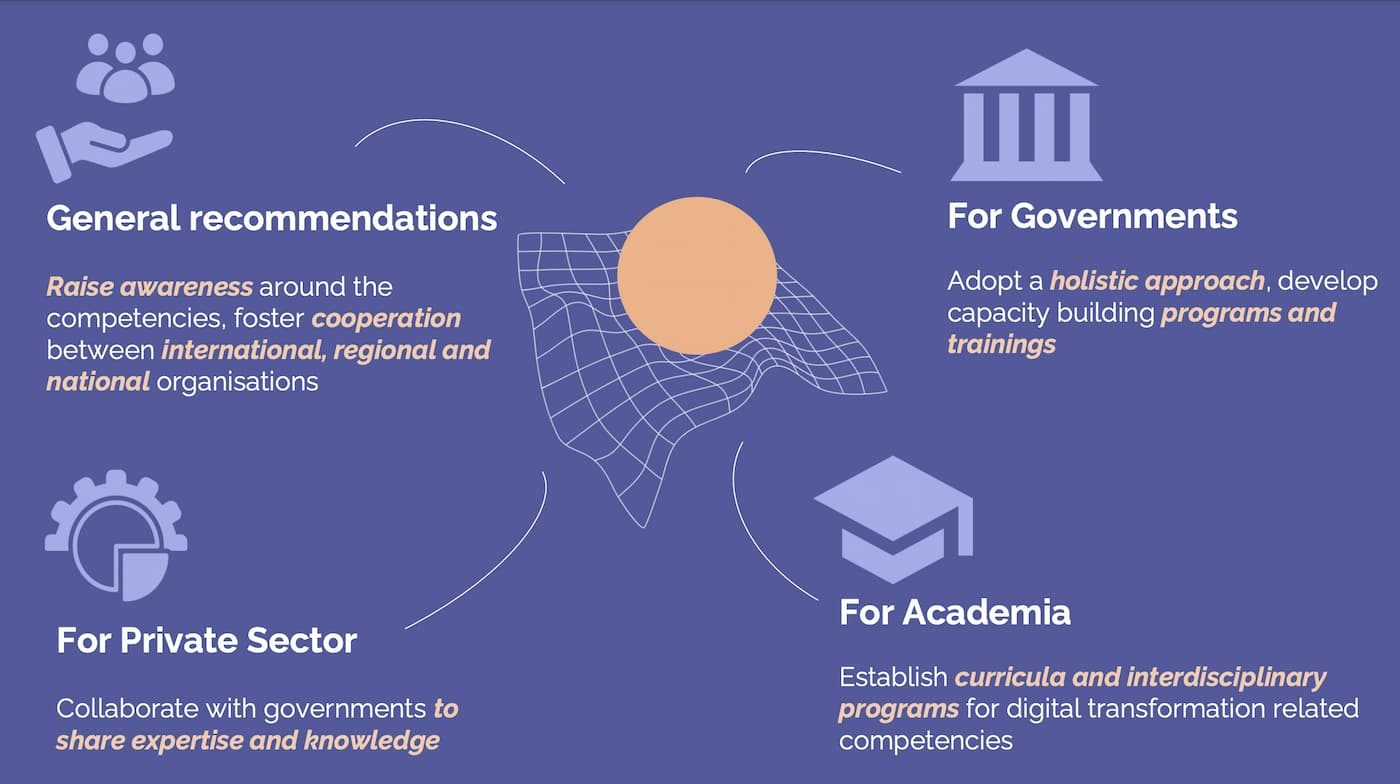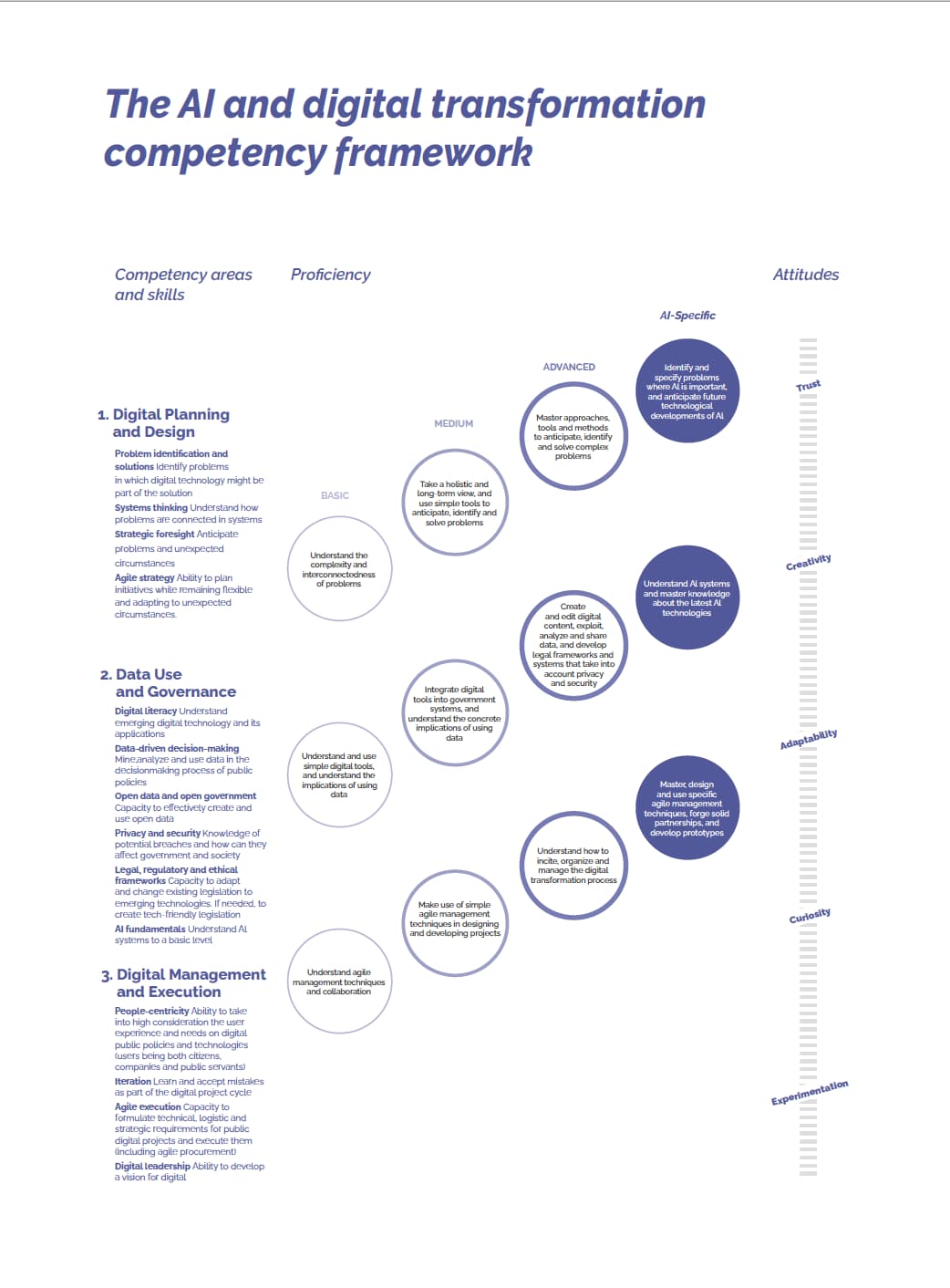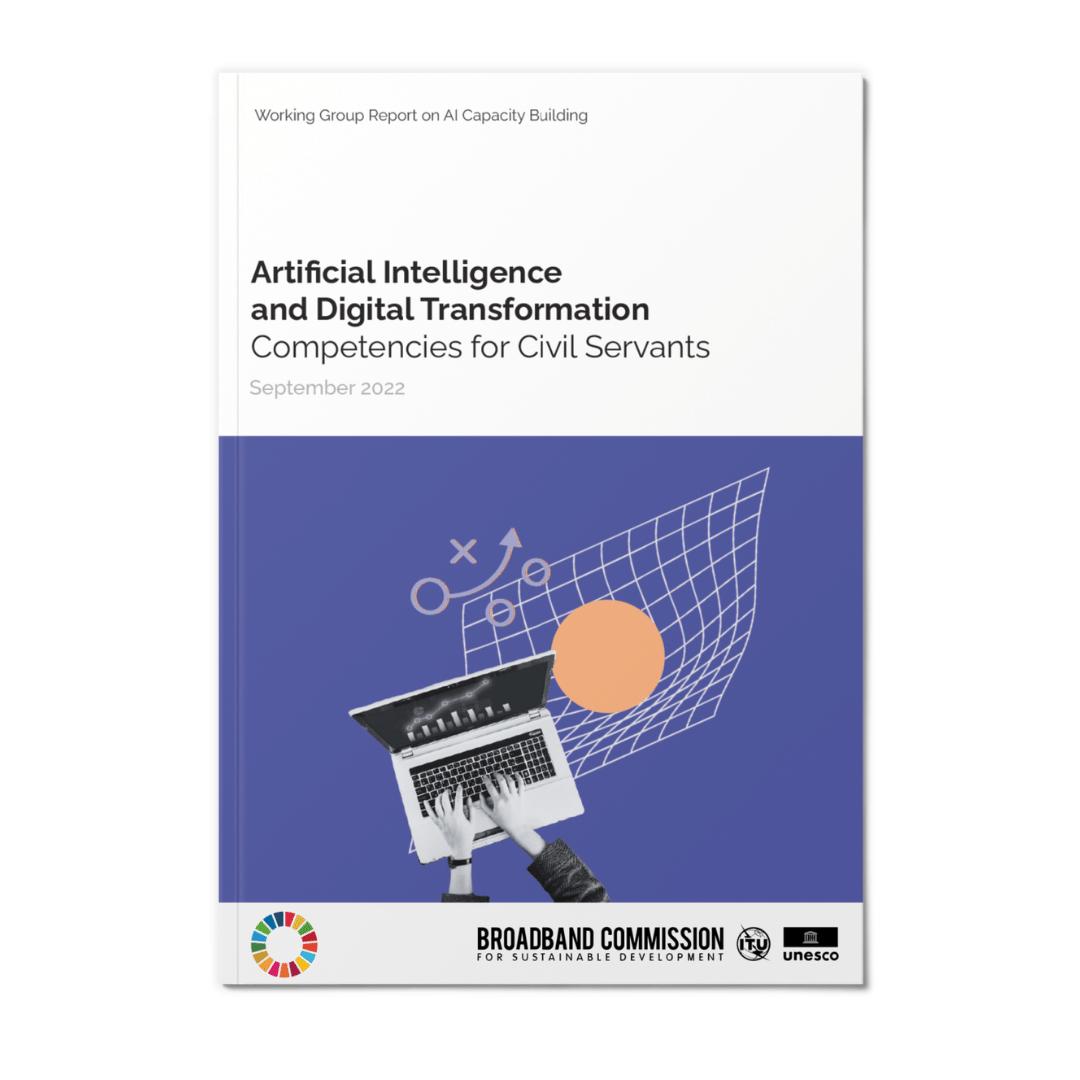What competencies do public sector officials need to enhance national digital transformations?
The Broadband Commission Working Group on AI Capacity Building has leveraged a multi-stakeholder leadership model to assess the critical capacity needs for public sector digital transformation, including from a developing country perspective. Through interviews with policymakers, global and regional expert consultations and evaluation of current international practices, the Working Group has developed three competency domains and nine recommendations. The output is a competency framework for civil servants, spelling out the Artificial Intelligence and Digital Transformation Competencies needed today.
Chaired by Ms. Audrey Azoulay, Co-Vice Chair of the Broadband Commission, and Director-General of UNESCO, and Broadband Commissioner Mr. Pekka Lundmark, President and CEO of Nokia, the Working Group’s 2022 Artificial Intelligence and Digital Transformation Competencies for Civil Servants Framework was launched at the Annual Fall Meeting of the Broadband Commission in September 2022. It calls for civil servants worldwide to enhance their competencies to implement digital and AI transformation initiatives in the government and to create an enabling environment for digital transformation.
You can download the framework here.


Setting the Stage
Background Overview
The Artificial Intelligence and Digital Transformation Competencies for Civil Servants Framework strengthens the abilities of civil servants to effectively use digital tools, develop and implement digital transformation projects, and address complex governance challenges.
The Competency Framework for Civil Servants for Digital Transformation, including AI, aims to:
- Promote trustworthy, inclusive and human rights-centric implementation of AI technology.
- Enhance the capabilities of civil servants to engage in national digital transformations
- Build a knowledge platform for future capacity-strengthening efforts by the Broadband Commission, including localized initiatives
Three Challenges and Approaches for Digital Transformations
Key challenges
A work culture averse to experimentation and innovation, along with low level of leadership support to pursue innovative ideas, poses challenges to digital transformation initiatives in governments.
47% out of 198 countries do not have a strategy to improve digital skills, which impedes efficient digital transformation and calls for further investment in their development in the public sector (Dener et al., 2021)
These challenges include lack of IT infrastructure investment, lack of available, accessible datasets and lack of mature data organisation, data management and data governance practices – they obstruct national digital transformation efforts.
Out of 32 African countries surveyed, 80% have requested policy advice for the development of aspects of AI policy concerning education, sciences, culture and communication and information (AI Needs Assessment Africa Report, UNESCO)
AI and digital transformation – related competency gaps are magnified with low investment into digital, data analysis, IT and AI skills and the lack of adaptation of procured digital technology and digital systems to fit the organisation’s unique context.
68% of the 32 responding African countries needed initiatives for knowledge exchange concerning AI governance and 78% requested support training for government officials. (AI Needs Assessment Africa Report, UNESCO)
Competency Domains
Enables civil servants to understand the complexity of today’s problems, recognise strategic opportunities to use digital solutions, and envision and design inclusive digital transformation projects. Competencies: systems thinking, problem identification and solutions, strategic foresight, agile strategy.
Equips civil servants to understand and use data – its fundamental role, value, and opportunities, inherent risks. Supports civil servants to address governance challenges and use data effectively, ethically, and responsibly. Competencies: digital literacy, data-driven decision making, open data and open government, privacy and security, legal, regulatory, and ethical frameworks, AI fundamentals.
Empowers civil servants to understand new and innovative project-management and collaboration practices to enhance the success of digital transformation initiatives. Competencies: people-centricity, iteration, agile execution, digital leadership.
The Way Forward
Working Group Recommendations

Five recommendations for stakeholders
Raise awareness of artificial intelligence and digital transformation competencies
These competencies are foundational for successfully implementing digital transformation in government and creating an enabling environment for digital transformation in society through improved digital governance.
Contextualize, localize, and adapt AI and digital transformation competencies
Competencies must be contextualised, localised and adapted for their specific context, based on the analysis of capacity building needs at individual, team, department, and government levels. The proficiency levels embedded in all competencies of this competency framework can guide this contextualisation process.
Share learning resources for AI and digital transformation capacity building
Develop open learning hubs and multi-pathway curricula tailored to the learning needs of civil servants. Facilitate their training through networks of training institutions and through various modalities of learning.
Monitor the impact of AI and digital transformation projects
Monitor the impact of AI and digital transformation projects with qualitative and quantitative tools and in collaboration with research centres. Identify and share openly best practices.
Facilitate knowledge exchange and mutual learning through multi-lateral cooperation.
Create coalitions and platforms for exchanging good practices on AI and digital transformation-related capacity building at the national, regional, and international levels.
Four Targeted Recommendations

Recommendations for Government
Take a holistic approach when using the framework. Begin by developing a national AI and digital transformation strategy, then develop digital action plans on strengthening specific competencies.
Develop digital transformation-related capacity-building programs and trainings, as part of national digital transformation initiatives.

Recommendation for Academia
Leverage the framework to establish curricula and interdisciplinary programs for developing AI and digital transformation – related competencies.

Recommendations for Private Sector
Collaborate with governments to implement capacity-building initiatives by contributing expertise and knowledge based on experience with digital transformation.
The Working Group Model
Objective and Composition
Ms. Audrey Azoulay
Director General, UNESCO, Co-Vice Chair of the Broadband Commission
Mr. Pekka Lundmark
President and CEO of Nokia
- Achim Steiner, UNDP
- Baroness Beeban Kidron, 5Rights Foundation
- Houlin Zhao, ITU
- Lacina Koné, Smart Africa
- Dato Lee Yee Cheong, ISTIC
- Piotr Dmochowski-Lipski, EUTELSAT IGO
- Qu Dongyu, FAO
- Tedros Adhanom Ghebreyesus, WHO
- Ziyang Xu, ZTE
- Abdinassir Sagar and Pontus Westerberg from UN-Habitat
- Alby Bocanegra, Mastercard
- Alice T. Liu, I-DAIR
- Amal El Fallah Seghrouchni, The International Center of Artificial Intelligence of Morocco University Mohammed 6 Polytechnique
- Archita Misra, University of Oxford
- Arturo Muente, Inter-American Development Bank
- Arturs Mietulis and Derrick Muneene from World Health Organisation
- Ayisha Piotti, ETH Zurich
- Ben Hur Pinto and Carolina Matos from Open Knowledge Foundation
- Benjamin Prud’homme, Quebec Artificial Intelligence Institute (Mila)
- Carolina Aguerre, Universidad de ‘San Andrés’
- Combetto Marco, Gianluca Misuraca, Tangi Luca and Ulrich Peter from Joint Research Centre
- Conrad S. Tucker, Carnegie Mellon University
- Eleonor Sarpong, Alliance for Affordable Internet
- Elsa Estevaz and Frits Bussemaker from CIONET
- Emmanuel Ekulu, African Forum for Ethics and Governance of Artificial Intelligence
- Emmanuel Leouze, Data-Pop Alliance
- Gayan Peiris, Helin Su Aslan and Nicola Holden from UNDP
- Gerhard Hammerschmid, Hertie School
- Helani Galpaya, LIRNEasia
- Jess Reia, University of Virginia
- Jhalak Kakkar, Center for Communication Governance at National Law University Delhi
- Jodi Lis, IntraHealth
- John Shawe Taylor, International Research Center on AI
- Julia Jasinska and Robert Seidl from Nokia
- Katie Clancy and Matthew Smith from International Development Research Center
- Katharina Höne, DiploFoundation
- Lan Xue, Schwarzmann Scholars
- Marcelo Cabrol, IDB Lab
- Maria Fasli, University of Essex
- María Paz Hermosilla, GobLab UAI
- Marielza Oliveira, Cedric Wachholz, Joe Hironaka, Bhanu Neupane, Paul Hector, Prateek Sibal, Seet Ynn Tan, Steven Yang and Mirta Lourenco from UNESCO
- Meilin Victoria Scanish and Noah Stewart from SciencesPo.
- Miriam Stankovich, Center for Digital Acceleration
- Monique M. Kuglitsch, Fraunhofer HHI
- Nanjira Sambuli, Carnegie Endowment for International Peace
- Neil Sahota, ACSILabs Inc
- Saran Sadhvi, International Telecommunications Union (ITU)
- Stefaan Verhulst, The GovLab
- Tara Chklovski, Technovation
- P. Anandan, AI Matters Advisors LL
- Philipp Olbrich, GIZ
- Akanksha Ray, Turhan Muluk, Nuno Martins, and John Roman from Intel
- Vineeth Murthy, Tony Blair Institute for Global Change
- Yixin Zhong, Beijing University of Posts & Telecommunications
- Yolanda Lannquist, The Future Society
Focus Area
Outcome Resources
Co-Chairs
Ms. Audrey Azoulay
Director General, UNESCO and
Co-Vice Chair of the Broadband Commission
Mr. Pekka Lundmark
President and CEO of Nokia
Broadband Advocacy Targets
SDGs
Media
- What are the digital transformation and competency needs of the public sector?
- Civil Servant 2.0: Spotlighting digital competencies for policymakers at WSIS 2022 | UNESCO
- Civil Servant 2.0: Brainstorming with Southeast Asian experts on digital competencies for policymakers
- What are the digital competencies for civil servants in Africa?
- Developing digital competencies for civil servants in Latin America
- Are civil servants ready for digital transformation?
- Nokia and UNESCO’s new framework helps governments to use technology to make people’s lives better
- Enabling policy makers to become digital transformation leaders
- Permettre aux décideurs politiques de devenir des moteurs de la transformation numérique
- Posibilitar que los responsables políticos se conviertan en líderes de la transformación digital











